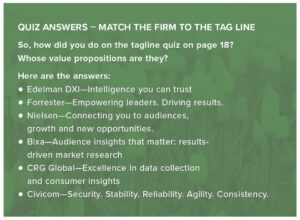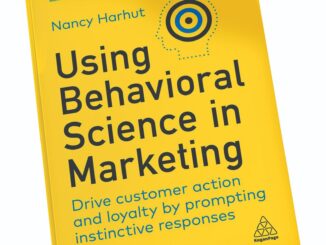
By Marilyn Heywood Paige
Principal
Heywood Paige
Greeley, Colorado
mhp@heywoodpaige.com

IN our saturated market research world, marketing to everyone means reaching no one. Now is the time to niche down to rise up. Strategic positioning isn’t just a marketing tactic; it’s a survival strategy. Done right, it’s the key to standing out, commanding premium prices, and weathering economic storms. It doesn’t matter if you are a solopreneur or a large firm—differentiating your services to appeal to distinct buyers will set you apart from the pack.
Standard Differentiation in Market Research Firms
Market research firms typically differentiate themselves by either the type of research they do (e.g., qualitative, quantitative, UX) or by the industries they serve (e.g., technology, healthcare, consumer products). But these are just the minimum requirements. These factors get the buyer to the right pool of providers, but they aren’t enough to make your brand stand out from competitors, command higher prices, or provide a buffer from economic uncertainty. When you have a distinct B2B brand, you can enjoy all of these benefits.1, 3

Differentiation in Overcrowded Markets
The fear of missing out haunts firms when they consider specialization. But in market research, especially, “Focus is power. You do it because the credibility you gain among your target audience will more than make up for the lost potential elsewhere.”3
Strong differentiation is common in high-growth firms.2 So, the question isn’t should you differentiate your market research firm, but in what ways?
Gary Rudman, founder of GTR Consulting, has centered his market research services on qualitative research involving kids, teens, and young adults. His specific focus on Gen Z began in 2020 when he wrote a series of articles and produced videos about millennials and Gen Z that deeply resonated with his target prospects.
In a recent conversation, he recounted, “Millennials were the hot button topic. Now it’s Gen Z. As I started talking more about these groups, it opened doors. I was at a conference and someone I didn’t know approached me and said, You’re the Gen Z guy!”
For Rudman, that moment solidified the value of differentiation. Since then, he changed his title to “Gen Z Whisperer” and has
spoken on the topic at QRCA, IIEX, the Brand Marketing Summit, and other industry conferences. He notes that his specialization “is a great conversation starter, and it creates momentum.”
When I asked about the effect differentiating had on his business, he said, “Once I had successfully identified myself as a specialist, my target leads were more focused, their interest was greater, and it led to more business. Being known as a Gen Z Whisperer in the industry has also led to referrals, word of mouth, and people and companies reaching out to me directly.”
How Should You Narrow in on What Differentiates You?
How you differentiate your insights organization must be authentic, relevant, and provable.3 For example, if you proclaim you have the largest database of alligator wrestlers in the world, you’d better have those wranglers on speed dial. Your database supremacy has to matter to a large target audience, and you must substantiate your claims. You can see the problems with differentiating between something that few buyers care about or that can’t be verified.
What Differentiation Matters to Your Audience?
Speed of insights often matters to research buyers, so Katrina Noelle and Janet Standen of Scoot Insights created a sprint research method where they condensed a research process into one day. Katrina said, “The idea for a Scoot sprint originally came from the fact that teams needed to make decisions. And, when it [research] just lived within the customer insights department, they didn’t get everybody on the same page moving in the same direction quickly. So, by involving a cross-functional team in the sprint, everybody is able to hear the voice of the customer, get on the same page, and choose the right direction to go.”
Other important decision-making aspects are experience, expertise, reputation, a well-defined methodology, robust quality control, and a history of delivering results on time and within budget. Most firms use one or several of these elements to differentiate themselves. However, there are some inherent challenges with this approach.
 What Happens When Distinctions are No Longer Distinct?
What Happens When Distinctions are No Longer Distinct?
Here are value propositions from several of the larger market research firms. Without electronic help, can you name the firm each statement belongs to?
- Intelligence you can trust.
- Empowering leaders. Driving results.
- Connecting you to audiences, growth, and new opportunities.
- Audience insights that matter: results-driven market research.
- Excellence in data collection and consumer insights.
- Security. Stability. Reliability. Agility. Consistency.
If you correctly identified the companies associated with three or more of these statements, you, coincidentally, must have just finished an in-depth competitor analysis. Otherwise, you—like the novice research buyer—still have no idea what unique value each of these firms can deliver.
Reputation, Relationships, and Shortcomings
When almost every player is saying the same thing about their market research services, differentiation becomes about reputation and relationships. It’s one reason the market research industry runs on referrals and word of mouth. But what happens when a firm wants to expand into a territory for which they have no reputation? How about when employees with strong client ties switch teams or retire? Relying purely on your reputation and relationships for sales has fundamental shortcomings.
For market research firms, reputation and relationship building are largely in the hands of your employees. Do you have consistent training for employees to help them improve their management of these two important sales drivers? For solopreneurs, your available time for reputation and relationship building is extremely limited. It’s likely a haphazard effort at best. There is a lever you can push that gives you more control of the marketing process. It’s differentiation.
Dive into What’s Authentic and Relevant About You
To break free from homogenous industry messaging, you’ll have to narrow in on what your firm does differently that is important to your target clients. So, when was the last time you did market research on yourself? Have you done any qualitative studies with your ideal customers or target audiences? It’s one of the best ways to find what sets you apart. Often, your true differentiator is not what you think it is.
At a dental medical device firm I worked with, the CEO, a dentist and former practice owner, believed he knew everything about his target audience, and thus what differentiated his product in the marketplace. Despite their failing marketing campaigns, it was like pulling teeth (Yeah, I said it.) to get him to agree to some qualitative market research.
When I delivered my findings, the CEO went from disdainful, with arms crossed, to leaning in with acute interest. My research discovered a hidden motivation of his target audience and, therefore, a way to differentiate his product from competitors. Boom! Incorporating these findings into their messaging dramatically improved their marketing outcomes.
Market Researcher, Heal Thyself
The good news is you have the means to conduct a qualitative study with your best current customers and your ideal target clients. The bad news is you should not do this yourself. To do it, you will require an outside provider, as you will be biased in your efforts. So, trade favors with a firm or solo researcher you are friendly with. You can do their research, and they can do yours.

The Questions that Uncover Differentiation
Remember that differentiation is about messaging. It’s not about gaining distinction by changing what you do or how you do it. (Of course, you can change your product, process, or service, but that would be a lot harder and slower.)
Here are questions to use with current best clients to discover your differentiators:
- What challenges were you initially trying to solve when you first hired my/our market research firm?
- What other solutions did you consider for solving those challenges?
- What made you consider those other firms?
- What made you first decide to hire my/our market research firm?
- What made you think you could trust my/our firm to solve your challenges?
- Why do you continue to work with my/our market research firm?
- What do you value most in my/our firm’s market research processes?
- What do you like least about market research in general?
- What value do you receive from working with my/our market research firm?
- When you tell others about working with my/our market research firm, what do you say?
- How did you use the insights my/our firm provided to you?
I’m sure there are talented researchers reading this who can come up with more questions and exercises to uncover the insights to fuel your differentiators. In essence, you are looking for the buyer’s pain points, the trust signals that influenced their decision to hire you and stay with you, and the value they receive from doing business with you. That should give you a good list of differentiators to choose from.
Make Sure Your Differentiators Stand Up to Your Competitors
Now you want to put that list in context with your competitors. What your competitors say about how they differ from you and other market research firms should be part of this process. An analysis of your competitors’ strengths, weaknesses, opportunities, and threats (i.e., SWOT), target audiences, value propositions, differentiators, keywords for website search optimization (i.e., SEO keywords), and reputation will inform you of where the gaps are in the market that you can leverage. (Yes, this is very involved. If you want the quick and dirty method, limit your examination to all your competitors’ target clients, value propositions, and differentiators.)
Once you have done these internal and external reviews, you can decide which differentiators to message. If you have the time and budget, do some follow-up studies to confirm your decisions.
The Cost of Not Differentiating
Too many of you reading this will decide it’s too much work to follow this prescription. You’ll argue that you don’t want to limit yourself by choosing a niche. As of 2024, there were 45,201 market research businesses in the United States.4 If tens of thousands of businesses are selling exactly what you sell, what are the odds that a buyer will choose your services over the other 45,000-plus competitors? You can change those odds by differentiating.
A strong brand, built through differentiation, is a key long-term asset for sustainable growth. A lack of differentiation makes you more vulnerable to market fluctuations and economic shocks.5 In other words, you’re losing more by not differentiating.
It’s Only as Good as Your Messaging
This is the last point I want to make about differentiating your market research firm. If you don’t consistently and powerfully communicate your chosen differentiators, they don’t exist. It’s lovely to inform your sales team about your newfound differentiators, but your website, social media, advertising, and all other brand messaging must be updated to reflect this new positioning. How about a case study or two that highlight your differentiators?
The cost and effort to update all your messaging across all channels with your new differentiators is worthwhile—you should feel excited about your differentiators and believe the investment in their messaging is worthwhile.

Why Now?
Everyone is feeling the burn of the shifting sands in market research right now. Instead of being fearful or taking a wait-and-see approach, now is the right time to take action! There are thousands of firms offering qualitative or quantitative research. What’s going to make a buyer more motivated to buy from you? If you start competing on price, that’s a race to the bottom you don’t want to win.
Instead, practice what you preach, and find out everything you can about how and why your ideal client buys market research. Dig into your competitors’ offerings and messaging frameworks. Your analysis will uncover authentic differentiators that will resonate and set you apart.
Double down on your unique strengths, invest in consistent messaging, and your firm will attract the buyers you want. I promise!
References
- Solomons, M., 100 branding statistics, global impact, and consumer perception. www.linearity.io/blog/branding-statistics, 2023
- Frederiksen, L.W., Taylor, Aaron E., Spiraling Up: How To Create A High Growth, High Value Professional Services Firm, Hinge Research Institute, 2010
- Differentiation Guide for Professional Services Firms, Second Edition, published by Hinge Research Institute, 2018
- Market research in the US – Number of businesses (2005–2031). (2025, March). IBIS World. Retrieved May 29, 2025, from www.ibisworld.com/united-states/number-of-businesses/market-research/1442
- Laja, P. (2025, April 14). Differentiation Strategy: what it is, why it’s critical, and how to get it right. CXL. Retrieved May 24, 2025, from https://cxl.com/blog/differentiation-strategy




